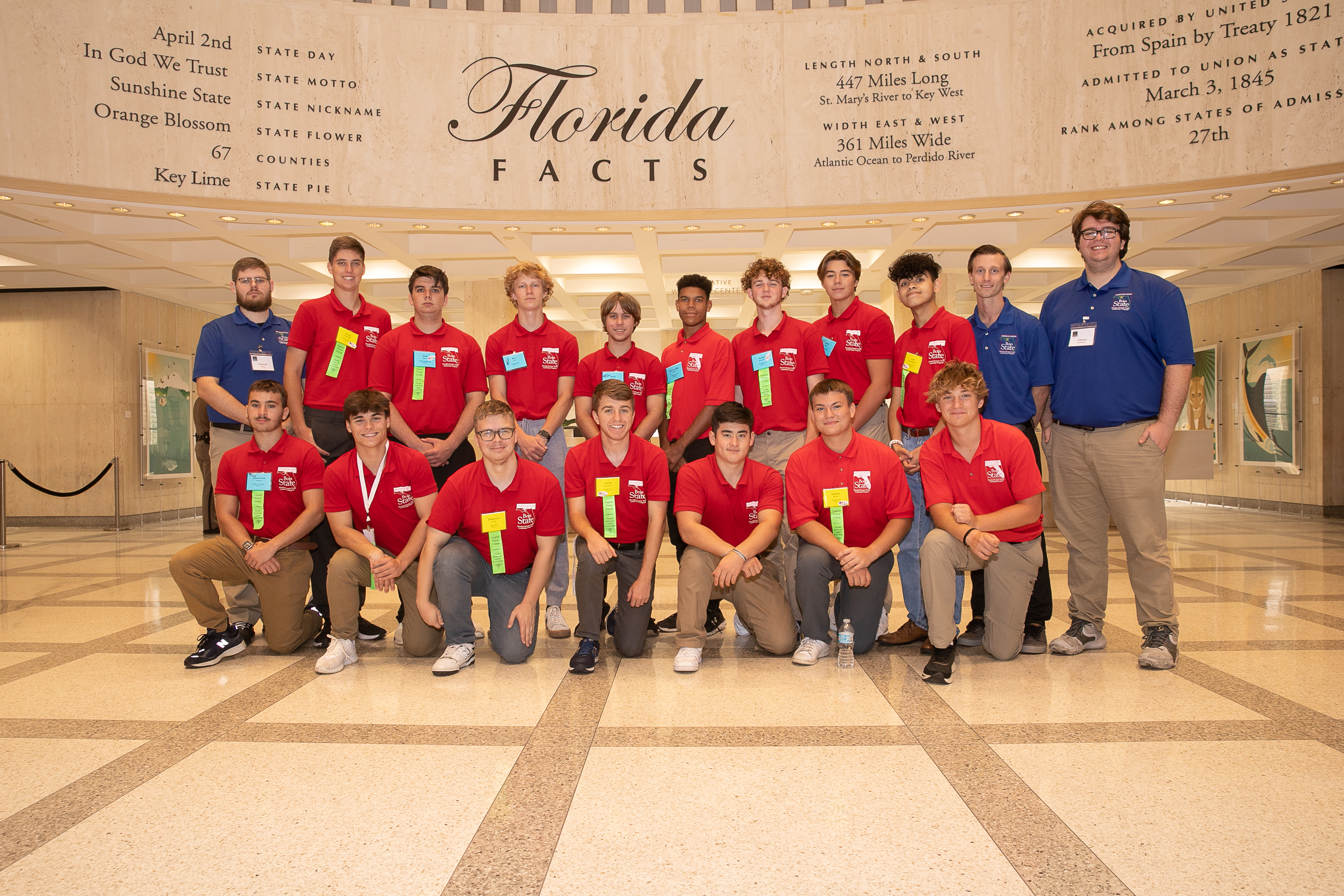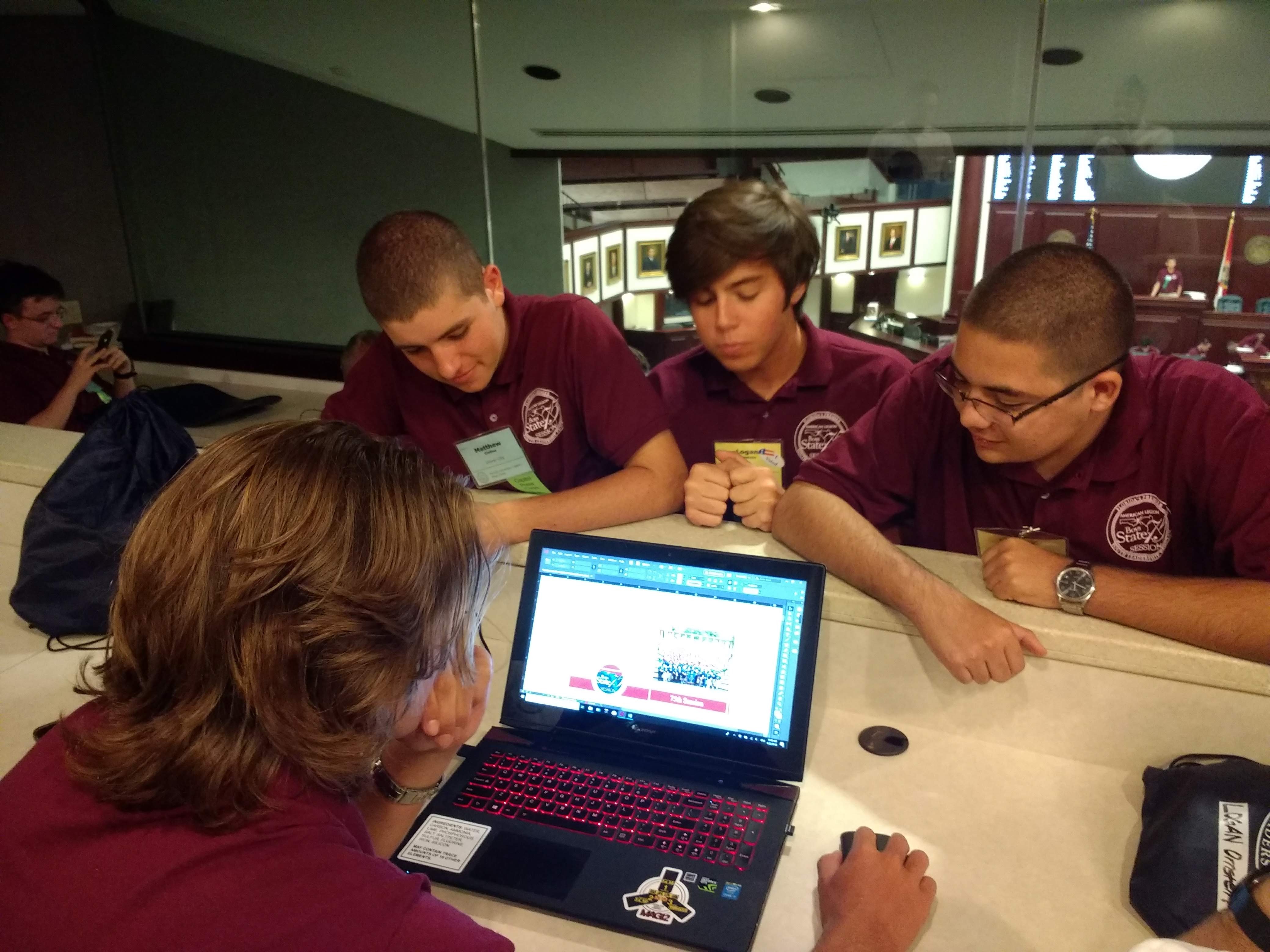PRESS CORPS

About The Forth Branch
Along with the three traditional branches of government, there exists a “fourth” arm that influences public policy and information - the media.
Just as actual members of the media work under tight deadlines, the Boys State approach is no different, reporters work on stories in order to have them ready in a timely manner for their deadlines throughout the day. This means that each reporter works on the production of their news stories, in some cases, while other Boys State citizens are involved in other activities, during breaks in the program, or even after the rest of Boys State has gone to sleep.
Getting The Word To The People
Capitol Press Corps Reporters are also responsible for administering the Boys State gubernatorial debate. The debate’s moderator and six panel members ask questions of the two candidates for Governor on issues of policy and planning.
Join the Press Corp
The Boys State Inquirer daily newspaper is comprised of:
• Editor-in-Chief
• Photographers
• Staff Writers
Video News Teams are each comprised of:
• News Director
• Reporter(s)
• Camera Operator(s)
• Video Editor(s)
Sine Die the Boys State Yearbook is comprised of:
• Editor-in-Chief
• Layout / Design Editors
• Photographers

Press Corps Education
Introduction
- The same First Amendment freedoms that allow U.S. media outlets to publish without fear of government interference also make it nearly impossible to impose a standard of ethics or professional protocol for journalists. No organization exists to certify journalists, and likewise, no uniform system exists for penalizing unethical behavior.
- Nonetheless, professionals in the field generally take great pride and responsibility in their roles, and organizations such as the Associated Press and the Society of Professional Journalists offer thorough and useful guidelines for ethical conduct.
- Generally, ethical concerns in the media can be grouped into a few broad categories. The following points synthesize and summarize some important ethical concerns proposed by the Associated Press and the Society of Professional Journalists.
Accuracy
- Check the accuracy of information from all sources to avoid error.
- Subjects of news stories should always have the opportunity to respond to any allegations of wrongdoing.
- When mistakes are made, they must be corrected – fully and quickly.
- Headlines, news teases and promotional material, including photos, video, audio, graphics, sound bites and quotations, should never misrepresent, oversimplify, or highlight incidents out of context.
Treatment of Sources
- Identify sources whenever possible so that the public has as much information possible to determine the sources’ reliability.
- Always keep any promises made in return for the source’s cooperation.
- Only guarantee a source’s anonymity when the source insists upon it, when he or she provides vital information, when there is no other way to obtain that information, and when the source is knowledgeable and reliable.
- Strive to quote sources accurately and in the proper context.
Avoiding Bias
- Distinguish between advocacy and news reporting. Analysis and commentary should be labeled, and not misrepresent fact or context.
- Distinguish news from advertising and avoid hybrids that blur the two.
- Examine your own cultural values and avoid imposing those values on others.
- Avoid stereotyping by race, gender, age, religion, ethnicity, geography, sexual orientation, disability, physical appearance or social status.
- Support the open exchange of views, even views you might find repugnant.
Avoiding Distortions
- Never knowingly introduce false information into material intended for publication or broadcast.
- Never alter photo, video, or image content.
Gathering Information
- Avoid undercover or other surreptitious methods of gathering information, except when traditional open methods will not yield information vital to the public.
- Use of any non-traditional methods of gathering information should be explained as part of the story.
- Rely on the most up-to-date and accurate research when gathering facts for a story.
- Never plagiarize.
Minimizing Harm
- Show compassion for those who may be affected adversely by news coverage, especially children and inexperienced sources or subjects.
- Be sensitive when seeking or using interviews or photographs of those affected by tragedy or grief.
- Understand that private people have a greater expectation of privacy than do public officials and others who seek power, influence or attention.
- Be cautious about identifying juvenile suspects or victims of sex crimes.
- Be cautious about naming criminal suspects before the formal filing of charges.
Avoiding Conflicts of Interest
- Avoid conflicts of interest, real or perceived.
- Remain free of associations and activities that may compromise integrity or damage credibility.
- Always refuse gifts, favors, fees, free travel and special treatment.
- Avoid secondary employment, political involvement, public office, or service in community organizations if they compromise journalistic integrity.
- Disclose unavoidable conflicts.
- Deny favored treatment to advertisers and special interests.
- Be wary of sources offering information for favors or money.
Conclusion
- There is no standard for ethical journalistic practice, but two widely regarded organizations, The Associated Press and the Society of Professional Journalists, offer useful and time-tested guidelines. When in doubt, always confer with a trusted colleague or supervisor.
Article Sources
“The Associated Press Statement of News Values and Principles.” www.ap.org 16 Feb 2006. https://www.ap.org/about/news-values-and-principles/.
“Society of Professional Journalists: Code of Ethics.” www.spj.org 18 Dec 2008. http://spj.org/ethicscode.asp.
Article Acquired
Media Ethics, Purdue University, https://owl.purdue.edu/owl/subject_specific_writing/journalism_and_journalistic_writing/media_ethics.html